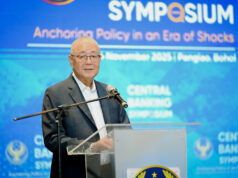Budget chief flags risk to spending
By Elijah Joseph C. Tubayan
Reporter
THE ECONOMY may not benefit as much from state spending — lately a key driver of gross domestic product growth — at least in the first half of next year due to an expected delay in enactment of 2019’s proposed P3.757-trillion national budget and the ban on public works ahead of the May mid-term elections, the head of the Department of Budget and Management told reporters on Tuesday.
Budget Secretary Benjamin E. Diokno said the government will likely see a five-month pause in the implementation of new projects, now that Congress plans to submit the proposed 2019 national budget for President Rodrigo R. Duterte’s signature on Feb. 7 and an April-May ban on public works ahead of elections.
Mr. Diokno said he expects Mr. Duterte to sign the 2019 General Appropriations Act (GAA) in “mid-March.”
“The delay in Congress’ approval of the budget will result in delayed implementation of new projects in 2019. No new projects can start until the 2019 GAA is passed and signed into law. Without our infrastructure budget of close to P1 trillion in 2019, expect our ‘Build, Build, Build’ program to slow down,” he said in a briefing.
“If you review the performance of the economy this year, it’s actually government spending and government construction which is contributing to growth. Can you imagine if there’s no construction? That will slow down growth; it will also slow down employment… they are the major drivers of growth, so can you imagine if there’s a slowdown?”
State spending contributed 11.8% to January-September gross domestic product (GDP), increasing by 13.1% year-on-year in that period, while public construction alone contributed 0.7% to GDP and grew 22.9%.
The government last operated on a reenacted budget in 2019 under then-president Gloria M. Arroyo, who is now Speaker of the House of Representatives.
Mr. Diokno said the government will not be able to front-load public works — a practice to avoid the rains in the second semester.
In order to achieve the government’s 7-8% GDP growth target for 2019, “[t]here will be a make-up plan… right after approval of the budget — assuming that there will be no severe rains because that’s… enemy number one of construction…” he added.
At the same time, such delay will not affect big existing projects that are covered by the Multi-Year Obligational Authority (MYOA).
“It’s the small projects that are not covered by the MYOA. What was released in 2018, they can already implement especially when you have already contracted it out,” said Mr. Diokno.
House deliberations on the proposed 2019 budget were stalled for about two weeks in August over lawmakers’ opposition to the Executive’s shift to a national budget based on the limited spending capacities of departments and agencies. The chamber approved the spending plan on final reading on Nov. 20.
Sought for comment, Bernardo M. Villegas, economics professor at the University of Asia & the Pacific, said in an e-mail: “I don’t think it (reenacted budget) will have any negative impact on growth.”
“The budget last year is big enough to support the expenditures for 2019,” Mr. Villegas explained.
“The bad habit is just a consequence of the Filipino culture of not doing things on time. There are always excuses for delays.”
For Filomeno S. Sta. Ana III, coordinator of think tank Action for Economic Reforms: “Budget re-enactment is bad practice.”
“It disrupts efficiency and effective planning. It also means less spending if the budget not approved is higher than the re-enacted budget,” Mr. Sta. Ana explained.
“Further, Executive can become arbitrary on the allocation of the re-enacted budget,” he added.
“One with a naughty mind cannot but wonder whether the re-enacted budget will be used for election purposes.”



